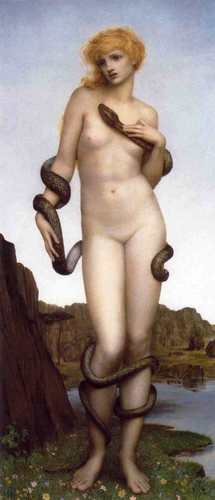THE GODDESS HARMONIA IN GREEK MYTHOLOGY
Harmonia was a minor goddess of the Greek pantheon, the Greek goddess of Harmony, and therefore the antipathy of the goddess Eris (Strife).
Harmonia is famous in Greek mythology for being married to a mortal hero, Cadmus, and for owning the Necklace of Harmonia, a wedding gift that brought disaster to generations of mortals associated with the city of Thebes.
Harmonia is famous in Greek mythology for being married to a mortal hero, Cadmus, and for owning the Necklace of Harmonia, a wedding gift that brought disaster to generations of mortals associated with the city of Thebes.
Harmonia Daughter of AphroditeHarmonia was the daughter of Aphrodite and Ares, although of course Ares was not the husband of Aphrodite, for the Greek goddess of beauty was married to Hephaestus.
The beautiful Aphrodite was less than enamoured by being married off to the ugly Hephaestus and so had taken herself a lover in the form of Ares. Hephaestus would eventually catch Aphrodite and Ares in a magical net, and the infidelity of his wife was shown to all the other gods and goddesses. Nevertheless the relationship of Aphrodite and Ares did bring forth Harmonia. Occasionally it was said that Harmonia was actually the daughter of Zeus and the Pleiad Electra, born on the island of Samothrace, but this parentage is rarely eluded to. |
Harmonia and Cadmus
Harmonia was considered to be the goddess who brought harmony to the lives of mortals, especially in marital arrangements, although the goddess is not famous in ancient texts for this role. Indeed, Harmonia is primarily known for being married to the Greek hero Cadmus.
Cadmus had had many adventures but had eventually built a new city called Cadmeia in Boaetia, a city that would later become known as Thebes.
Having pleased the goddess Athena with a sacrifice, Cadmus would be aided by the goddess of wisdom, but Cadmus had also angered Ares, by killing a serpent sacred to the god. Ares had them transformed Cadmus into a snake for a period of time in retribution for the killing.
Nevertheless, when Cadmeia started to flourish Athena persuaded Zeus that Cadmus was worthy of an immortal wife, and this wife was to be Harmonia.
Cadmus had had many adventures but had eventually built a new city called Cadmeia in Boaetia, a city that would later become known as Thebes.
Having pleased the goddess Athena with a sacrifice, Cadmus would be aided by the goddess of wisdom, but Cadmus had also angered Ares, by killing a serpent sacred to the god. Ares had them transformed Cadmus into a snake for a period of time in retribution for the killing.
Nevertheless, when Cadmeia started to flourish Athena persuaded Zeus that Cadmus was worthy of an immortal wife, and this wife was to be Harmonia.
The Necklace of Harmonia
|
The marriage of Cadmus and Harmonia was a ceremony where all the gods and goddess attended, and the Muses sang at the banquet.
Many gifts were presented to Cadmus and Harmonia, including an elegant throne from Hera, a sceptre from Hermes and a spear from Ares. It was a robe and necklace that were presented to Harmonia by Cadmus that were the most important of all the wedding gifts. It was generally considered that Hephaestus had manufactured the necklace, making it an intricate piece, symbolising two snakes intertwining, with jewels adorning it. Hephaestus though was still angry about the infidelity of Aphrodite, and so the necklace, and robe, were said to be cursed, destined to bring ill fortune to all those who possessed them. The Story of Harmonia and Cadmus ContinuesFor a while Cadmus and Harmonia were content in Cadmeia (Thebes) and a number of children were born to the pair, including Polydorus, the future king of Thebes, Ino, a future sea goddess, Autonoe, the mother of Actaeon, Agave the mother of Penetheus, and Semele, the mother of Dionysus.
|
|
Misfortune would befall Cadmus and Harmonia though, and the pair would leave Cadmeia and their children behind, as well as the Necklace of Harmonia.
Harmonia would accompany her husband into the unruly state north of Greece where the Encheleans lived.
Cadmus would aide them in their conflict with the other tribes in the region, and unifying several other tribes, Cadmus and Harmonia would thus gain a new kingdom.
Harmonia then gave birth to another son, Illyrius, who would succeed Cadmus as king, and would give his name to the region and tribal group, Illyria and the Illyrians.
Some tell of Harmonia and Cadmus being transformed into serpents by Ares to appease the god for the previous slaying of his serpent, but it was also said that Harmonia and Cadmus would pass on to reside in Elysium for eternity together.
Harmonia would accompany her husband into the unruly state north of Greece where the Encheleans lived.
Cadmus would aide them in their conflict with the other tribes in the region, and unifying several other tribes, Cadmus and Harmonia would thus gain a new kingdom.
Harmonia then gave birth to another son, Illyrius, who would succeed Cadmus as king, and would give his name to the region and tribal group, Illyria and the Illyrians.
Some tell of Harmonia and Cadmus being transformed into serpents by Ares to appease the god for the previous slaying of his serpent, but it was also said that Harmonia and Cadmus would pass on to reside in Elysium for eternity together.
|
|
